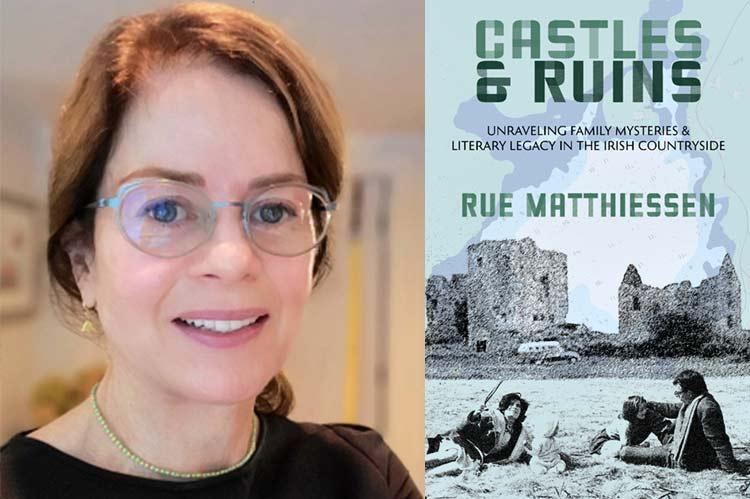“Castles & Ruins”
Rue Matthiessen
Latah Books, $19.95
Rue Matthiessen's heartfelt memoir, "Castles & Ruins," is, in essence, configured like a Celtic cross. That circle around the middle of the East-West transept is symbolic of Matthiessen's nearly lifelong emotional and intellectual pull between Long Island and Ireland. A pull made all the more dramatic given that she and her family — mother, father, and half brother — went to Galway, Ireland, when she was 7, and she herself didn't return for decades.
When she did make the pilgrimage, her own son, Emmett, was around the age she was during that early, pivotal summer, and all the while she was explaining to herself, through her son's eyes and through the eyes of her husband, Steve Shaughnessy, how extraordinary the trip had been.
Rue Matthiessen grew up in the heady literary world of Sagaponack. Her mother, Deborah Love, was a writer. Her father, Peter Matthiessen, was a founder of The Paris Review, which he helped establish in 1953. Peter Matthiessen's breakout book, "At Play in the Fields of the Lord," was published in 1965. He was much feted. But it was the '60s and times were tempestuous. Her mother was struggling to find her footing in the male-dominated world. Yet it was also her mother who provided Matthiessen with much of the ballast he required. She introduced him to LSD. She introduced him to Zen Buddhism.
That year, 1965, her parents, in hopes of holding their marriage together, decided to travel to a small place in the shadow of Annaghkeen Castle where Rue and Luke, age 12, could frolic. While Peter and Deborah wrote. Not long after the family's return to Long Island, Deborah compiled a journal, combining her impressions of Annaghkeen with her young daughter's thoughts. And thus the framework for this memoir.
Shortly after the publication of "Annaghkeen" in 1970 Deborah Love was diagnosed with ovarian cancer. She died in 1972. And, in large part, her daughter put aside that part of her life.
Until she began questioning large parts of her early life. With another writer, the memories might feel like dredging. Not with Rue Matthiessen. She is wide-eyed as she describes the fact that her mother distanced herself from the everyday. Often there was so little food in the house that Rue found herself breaking into cans of Alpo. She is fascinated by her parents' differences — describing them as distinct from each other, "each a blade of grass and flower that had done its work and is now finished." An allusion to her mother's book.
She also describes her father's detachment. "My father was different. Ireland was a pit stop, a strange flavor, a blip upon the surface of the years when his career was really materializing. Ireland was the two of them in the red VW, singing 'Danny Boy,' my mother crying, even my father crying, which didn't often happen — one tear finding a way down his craggy cheek. . . . My father wasn't very involved with us, though he liked that we were there. He wrote all the time. He was never very connected with any of his family during the whole of his life, except for Alex. But in Ireland, he hadn't made the later arrangements. He hadn't yet formed the old turtle's hide. He hadn't yet said, 'You take this, and I'll take that, and that's the deal.' His later life and art were areas hermetically sealed from each other, yet there was an estuary in between, a place of occasional flooding. He was still giving it a try, putting his heart into it. The flooding didn't happen very often, yet when it did, his vivid presence, his tenderness and intensity of feeling were unique. He was extremely hard to reach, except on the subject of language. He lived for language, for the magic of it."
As did her mother.
Throughout "Castles & Ruins" Matthiessen uses her mother's work as a touchstone, looking for the Ireland of her youth and the magic her mother conveyed. Longing to convey to her husband and young son the mysteries she experienced and that the three of them experience on their journey together. They can't find drinkable coffee or tea in Ireland. Matthiessen is appalled by the number of leering leprechauns on tea towels and saucers. Yet the trio is charmed by the people they meet. Annaghkeen doesn't seem to be marked on any maps they have. Yet suddenly, like Brigadoon (yes, yes, that's Scottish), the castle appears. And this family is made ever stronger.
"Nobody watches me like Steve. When I am far away, nobody would know except for him. He doesn't know where I go and fundamentally isn't that interested. But he knows the basics: It's 1965, I am seven years old. I am forty-eight, it's 1965. I am forty-eight, it is today. I am seven, it is today."
Again, we see how the figure of the circle figures to the very center of Matthiessen's being.
Celtic tradition calls for both mourning and celebrating at death. Precisely the emotions and the rituals that Rue Matthiessen gives the reader in this complex, deeply felt work.
Lou Ann Walker, a creative writing professor in the M.F.A. programs at Stony Brook University's Lichtenstein Center, lives in Sag Harbor. She is executive editor of TSR: The Southampton Review, a literary and arts journal.
Rue Matthiessen lives in Sag Harbor. "Castles & Ruins" comes out on Feb. 20.

